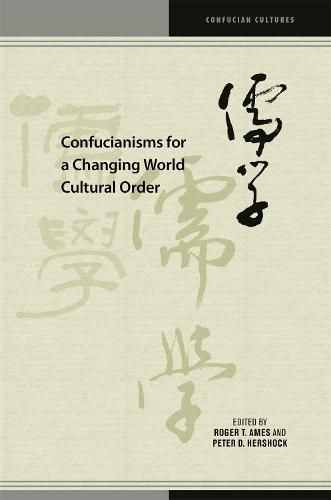Readings Newsletter
Become a Readings Member to make your shopping experience even easier.
Sign in or sign up for free!
You’re not far away from qualifying for FREE standard shipping within Australia
You’ve qualified for FREE standard shipping within Australia
The cart is loading…






In a single generation, the rise of Asia has precipitated a dramatic sea change in the world’s economic and political orders. This reconfiguration is taking place amidst a host of deepening global predicaments, including climate change, migration, increasing inequalities of wealth and opportunity, that cannot be resolved by purely technical means or by seeking recourse in a liberalism that has of late proven to be less than effective. The present work critically explores how the pan-Asian phenomenon of Confucianism offers alternative values and depths of ethical commitment that cross national and cultural boundaries to provide a new response to these challenges.
When searching for resources to respond to the world’s problems, we tend to look to those that are most familiar: Single actors pursuing their own self-interests in competition or collaboration with other players. As is now widely appreciated, Confucian culture celebrates the relational values of deference and interdependence-that is, relationally constituted persons are understood as embedded in and nurtured by unique, transactional patterns of relations. This is a concept of person that contrasts starkly with the discrete, self-determining individual, an artifact of eighteenth- and nineteenth-century Western European approaches to modernization that has become closely associated with liberal democracy.
Examining the meaning and value of Confucianism in the twenty-first century, the contributors-leading scholars from universities around the world-wrestle with several key questions: What are Confucian values within the context of the disparate cultures of China, Japan, Korea, and Vietnam? What is their current significance? What are the limits and historical failings of Confucianism and how are these to be critically addressed? How must Confucian culture be reformed if it is to become relevant as an international resource for positive change? Their answers vary, but all agree that only a vital and critical Confucianism will have relevance for an emerging world cultural order.
$9.00 standard shipping within Australia
FREE standard shipping within Australia for orders over $100.00
Express & International shipping calculated at checkout
In a single generation, the rise of Asia has precipitated a dramatic sea change in the world’s economic and political orders. This reconfiguration is taking place amidst a host of deepening global predicaments, including climate change, migration, increasing inequalities of wealth and opportunity, that cannot be resolved by purely technical means or by seeking recourse in a liberalism that has of late proven to be less than effective. The present work critically explores how the pan-Asian phenomenon of Confucianism offers alternative values and depths of ethical commitment that cross national and cultural boundaries to provide a new response to these challenges.
When searching for resources to respond to the world’s problems, we tend to look to those that are most familiar: Single actors pursuing their own self-interests in competition or collaboration with other players. As is now widely appreciated, Confucian culture celebrates the relational values of deference and interdependence-that is, relationally constituted persons are understood as embedded in and nurtured by unique, transactional patterns of relations. This is a concept of person that contrasts starkly with the discrete, self-determining individual, an artifact of eighteenth- and nineteenth-century Western European approaches to modernization that has become closely associated with liberal democracy.
Examining the meaning and value of Confucianism in the twenty-first century, the contributors-leading scholars from universities around the world-wrestle with several key questions: What are Confucian values within the context of the disparate cultures of China, Japan, Korea, and Vietnam? What is their current significance? What are the limits and historical failings of Confucianism and how are these to be critically addressed? How must Confucian culture be reformed if it is to become relevant as an international resource for positive change? Their answers vary, but all agree that only a vital and critical Confucianism will have relevance for an emerging world cultural order.